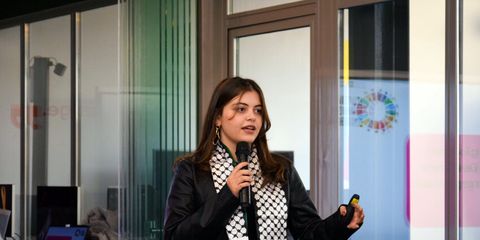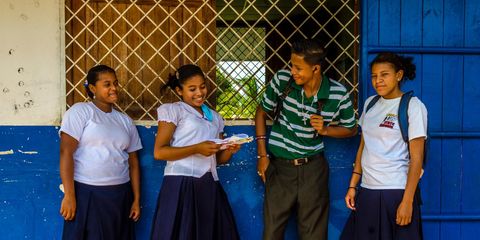Shamirah: I want to see a future without stigma and discrimination
Shamirah campaigns for access to sexual and reproductive health and rights – especially for girls and young women living with HIV. She shares with us her view on the future girls want.

Shamirah is due to graduate as a midwife this year. A passionate advocate for girls’ rights, she campaigns for access to sexual and reproductive health and rights (SRHR) – especially for girls and young women living with HIV, something she is an expert in as she is HIV positive herself.
“My name is Shamirah, I’m 21 years old and from Uganda,” she says. “I will graduate as a nurse midwife this year. I boldly disclosed my HIV status to the public to give another perspective to the public of who a person living with HIV is.”
Shamirah would like a future where girls and young women can access quality SRHR services without shame or judgement, enabling them to live freely and decide their own path in life. She would also like to see safe spaces and opportunities created for girls and young women living with HIV and a world that is safer for marginalised people.
“I am very passionate about advocating for sexual and reproductive health and rights and girls’ leadership participation – especially girls and young women living with HIV – because I am HIV positive. What I would like to do in the future is to continue to advocate for access to SRHR services for all adolescent girls and young women.”
Making consistent progress
“Since my journey of advocacy started, I have realised where my strengths are. I have been able to use my social media platforms to raise awareness and sensitise the public to the issues young women living with HIV face when accessing SRHR services and give them correct information and knowledge on SRHR, including HIV. I have empowered many girls and young women through my online chats and events.
“I want to see a future without unsafe environments, stigma and discrimination. Together we can create a world that is safer for marginalised people.”
Shamirah
“I have also been part of community-led activities which involved stakeholders and policymakers so they can get involved and get to know the reality of what it is like in daily life to have a health condition.”
Shamirah adopts a practical approach to her work as an advocate. “I have also engaged in community dialogues and trained others on how to pass on SRHR messages and information to their communities, to help create equitable laws and policies for those who are living with HIV.
“I have created a safe space for girls and young women living with HIV through my disclosure of my HIV status to the public which has changed others’ perspectives.”
Fighting against stigma and discrimination
“Girls and young women living with HIV in my country are often denied SRHR services and leadership opportunities. They are also often stigmatised, discriminated against, isolated, judged and even at times they are made to pay for services which should be free of cost.
“Stigmatising those living with HIV only leads to less people seeking information and sexual and reproductive health services – which can lead to an increase in cases.”
“I’m glad to speak out on this issue, because I see people who should show care and support to people living with HIV who just need more education.”
For Shamirah, there are a few measures to take to support people living with HIV:
- Create equal opportunities for girls and young women living with HIV.
- Raise awareness and share correct information on SRHR, including HIV.
- Economically empower girls and young women living with HIV through skills-training.
- Leaders must push for laws and policies that support all girls and women.
“I want to see a future without unsafe environments, stigma and discrimination. Together we can create a world that is safer for marginalised people,” says Shamirah.
“The future girls want is one where they can access quality SRHR services without shame or judgement so all girls and young women can thrive and live free and full lives of their own choosing.”
“Stigmatising those living with HIV only leads to less people seeking information and sexual and reproductive health services – which can lead to an increase in cases.”
Shamirah
The Future Girls Want
As we celebrate International Women’s Day on 8 March 2024, we are asking young people like Shamirah to share their vision for the future.
The Future Girls Want campaign (#FutureGirlsWant) aims to get the voices of girls and young people at the forefront of the conversation and in front of decision makers both at the global and national level.
Get involved and learn more about the better world girls, young women and gender equality activists want to see:



